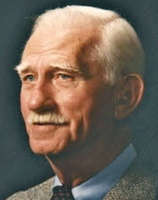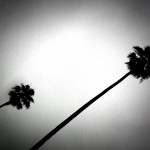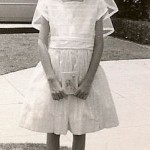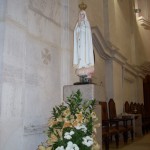 My sister and I lost the last of our mother’s generation this month. Uncle Fred, born in 1918, was the eldest of our mother’s 5 brothers; at going-on-95, he outlived her and his younger brothers—as well as two wives—by years, even decades.
My sister and I lost the last of our mother’s generation this month. Uncle Fred, born in 1918, was the eldest of our mother’s 5 brothers; at going-on-95, he outlived her and his younger brothers—as well as two wives—by years, even decades.
His memorial service at the First Congregational Church in Eugene, OR, where he offered to God his glorious bass baritone every Sunday morning until he was too weak to stand, is going on right now. We aren’t there, for reasons of expense and work and (in my case, anyway) denial. I don’t want to admit he’s gone, this penultimate family member standing between us and geezerhood. (Our Aunt Win, the last of my father’s 5 sisters and 1 brother, is still holding down the New England side, but we were never as close to Dad’s family as to Mom’s once we left Boston.)
Fred was the only one of his Jesuit-educated, head acolyte brothers to Leave The Church as a young man and not go back except for family funerals, a source of much grief and prayer to my mother and grandmother. I asked him about it when I was in my teens, and wondered why this most culturally Catholic of the bunch, who loved Gregorian chant and the Latin Mass even as he read liberation theology, didn’t just follow the course of his brothers—putting in time, disagreeing with the Church on mostly everything but not riled up enough about it jump ship. Fred was shocked.
“I love the Church too much to do that!” he snapped. “I argued with my Jesuit friends for years over questions I had, things I absolutely could not find it in myself to believe and assent to. When it became clear to me that I could not be a faithful Catholic, I left. It would have been dishonest to do otherwise.”
Fred’s politics would have put him with the Nuns on the Bus if he hadn’t been so faithful to his conscience. Instead, in an ironic twist, he ended up a Congregationalist, in the church that had been my grandfather’s before he converted to marry my Irish grandmother, the same church that had been our rock-ribbed Massachusetts Puritan ancestors’ back to the arrival of Robert Kinsman on the Mary and John in 1634.
I know that Fred would be written up in a lot of people’s books as an apostate. I hope and pray God’s accounting differs—or at least that He’ll let Fred engage in a good judgment day argument about it, preferably over some of that great wine Jesus saves for last. He was by no means a saint, and his sons, our much younger cousins (who have with God’s grace long made their peace with each other and with him), would probably describe his fathering skills as unique and complicated. But there was no better uncle, ever. I hope every kid has at least one who comes close.
For Fred’s 90th birthday party almost 5 years ago I wrote a tribute. I couldn’t be there, either, so my sister read it through laughter and tears. Fred is being well eulogized today by his longtime best friend, but if I had been there I would have retooled the 90th birthday tribute just a little to say this:
Funny came first.
Before we knew much about anything, we knew Unca Fred was good for a belly laugh—a tall, gangly scarecrow of a visitor with a bristly crewcut, a dead-on Yiddish accent for retelling the tale of Leetle Red from the Riding Hood, and the astounding ability to shoot a full set of dentures out through his lips and back again, like some kind of wind-up Halloween novelty. “Stickoutcherteeth!” we’d squeal, over and over, and he never got tired of it. It’s not, obviously, an image Fred’s more sophisticated pals can groove with, and maybe you had to be there—but we were there, hopping up and down in our chenille bathrobes, long after bedtime, and trust us, it was priceless.
Then he was Mr. San Francisco, lord of the vacation kingdom that was, for us, more magical than anything Disney could conjure. With Fred and Mary as guides, we learned to swing up onto a cable car, eat spicy soy crackers with green tea in the Japanese Tea Garden, play hide and seek among the fog-wrapped giants of Muir Woods, and make an endless line of baloney sandwiches on corner bakery bread with Jack cheese and Gulden’s brown mustard—still, we think, what heaven’s going to taste like. Later, at home, we called it all up again when we dressed in our incense-scented Chinese pajamas and our tabi slippers, and opened our tinkling Chinatown music boxes, and dreamed of next summer.
And though you would not guess it of that skinny guy, who was more likely to dress up in cynicism than in ermine-trimmed red velvet, there was a Santa Claus, and he was Fred. For decades, it was Uncle Fred who distributed our gifts on Christmas morning, more excited than anyone of any age, more a believer than even our Mom, who had once heard reindeer hooves. And it was Fred, looking around Mom’s Christmas dinner table that grew ever wider as it added his kids and our spouses, our kids and his kids’ kids, who would hold the last glass of Christmas wine to the candlelight and begin to sing “O Holy Night,” tears rolling down his face, without apology. We never stopped believing in Santa Claus, because there he sat.
This does not even begin to tell you of the wisdom Uncle Fred imparted. He made up for that thing with the teeth by sophisticating our whole family. He introduced Mom to the bitter tang of a gin and tonic (we’ve got a picture to prove it, of her wincing at the first sip, out on the deck at the Alta Mira in Sausalito) and now it’s our cocktail of choice, too. He ruined us, to the third generation, for wine coolers and white Zin, educating our palates in spite of themselves, so that now, when any of us is out for dinner in a group, it’s to us that the wine list is passed. His teaching, like Danny’s memorable first attempt at using the language of wine tasting, has always been “light, but not heavy.” With Fred we learned to order unforgettable meals at Ernie’s and savor hamburgers on sourdough at Sam’s in Tiburon, to send back the sherry if it’s Paul Masson in a La Ina bottle, to eat the salad last, to make scintillating small talk at grown-up dinner parties, to appreciate Peter, Paul & Mary and Bach’s Goldberg Variations and Dave Brubeck (all of which we heard first on Fred’s vinyl, from the stack of albums stored in the teak sideboard in the dining room on 23rd Avenue between Clement and Geary), to get the bittersweet humor of Peanuts cartoons, long before they were animated, to devour Jane Eyre and J. D. Salinger and Bulfinch’s Mythology and Regency romances and, in one memorable Christmas package, One Flew Over the Cuckoo’s Nest (which we had to rescue from the trash where Mom threw it when she saw it had “the F-word” on the first page), and to argue—with eloquence, logic, and biting wit—our position on absolutely anything.
Fred’s taught us a bit about loss, too, having had to let go of Mary, of Lucy, of our grandparents, of his brothers, all, and of our parents. No more than 5 minutes after our Mom died, we were on the hospital pay phone to Uncle Fred. “Can you come, now?” we begged. In his own grief, he was confused. “Isn’t your Dad there?” he asked. “Yes,” we said, “but we need a grown-up.” “You’re 40 and 37,” he countered, laughing in spite of the loss. “We know,” we said. “But we need Unca Fred.” He was on a plane that afternoon.
Who will be our grown-up now?
We can say it again, because he has gone, as Nana would say, to his reward, and we don’t care if the others overhear and are jealous: he was always our Favorite Uncle. And 94 was way, way too young.
Requiescat in pace, Frederick William Kinsman, though resting in peace was never your style. May God reward you 100 times over with the love and laughter you’ve given us our whole lives long.












